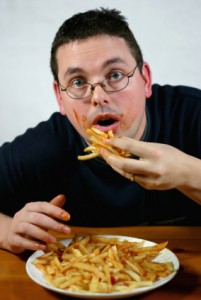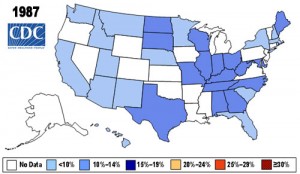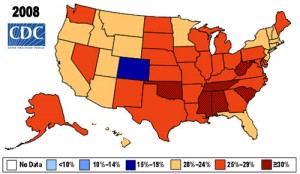The Psychology Of Weight Loss (And Why You Can’t Say No)

There comes a time in most of our lives when we have to stop and say enough is enough. When we’re no longer willing to put up with a situation that’s frustrated, stressed, or just plain annoyed us for months and maybe years. It might be saying no to unpaid and unappreciated overtime. It could be that you reach your wits ends at home and finally give your partner what for. That you realize a so-called friend is nothing but a negative grump whose attitude does nothing but drag you down to their level.
Or perhaps you’ve finally had it with carrying around those extra pounds. You’re sick of shopping for larger sizes, pretending you don’t care that you can’t pull off the latest fashions, and with making excuses every time you skip a workout or hit the take-out after a long day.
Things changed for me when I realized I was in danger of becoming an overweight Personal Trainer. Shame of not looking the part was one thing, but the disappointment I had in myself for not being consistent was far more powerful. Enough was enough. I’d reached the point where I was willing to make drastic change in order to take back control of my body and my life. I resigned from my all-consuming job as a Personal Training Manager (a move that’s been nothing but positive for my business and finances as well as my health), and forced myself back into some proper exercise habits. My health, fitness and energy improved rapidly, but the weight loss didn’t follow at first. In fact, it took me a good year or two to figure out my problem.
I was a pig.
I just couldn’t say no. Despite the fact that my partner at the time weighed 40kg (88 pounds) more than me, and that most of that was fuel-burning muscle, I regularly served myself the same amount as him. Sure, it was good healthy food – that’s probably why I didn’t recognize the problem at first. It had become normal for me to eat to overeat, and never to leave anything on my plate. After all, didn’t Mum always used to say we couldn’t leave the table until the plate was clear? Or no desserts till we’ve finished our mains?
When it comes to eating, we’re programmed to believe that failure to say no is a good thing.
That it’s a crime to leave a meal unfinished. And the real problem here is that you likely learned this habit as an active child and teenager, whilst being fed a pretty healthy, processed-food-free diet. Yes? But in the meantime, your daily activity levels have slowed and sometimes even ground to a halt, and the typical week’s shop contains just a fraction of the wholesome fresh foods you grew up on. If you actually do such a thing as a weekly grocery shop, that is.

Hold that thought for a moment and take a look at this map of the USA. It’s from the Center for Disease Control and Prevention (CDC) and outlines obesity trends across the different states in 1987. White states refer to not enough data, pale blue is obesity of less than 10%; medium blue 10-14%, dark blue 15-19%. As you can see, not a single state had an average obesity percentage of over 14%.

Compare it with this map outlining the trends from 2008. Only one lucky state sits in the 15-19% region. Beige is 20-24%, orange is 25-29%, and red is over 30%. Yesterday I read an article showing that New Zealand is number two behind the US in it’s obesity trends, and Australia is number 3. The UK follows shortly after. What on earth are they going to do over the next 5-10 years? There’ll be no more colors left! If you want to really give yourself a scare then go to the above CDC link and watch the slideshow of trends over the past 20 or so years. Pretty eye-opening stuff.
And now tell me this – is it still okay to never say no? To clear the plate at every sitting and keep nibbling until well into the evening? Or could it be time to say enough is enough?
That you don’t need to eat dessert every night. Even if it’s ‘healthy’.
That mid-morning and mid-afternoon snacks, no matter how wholesome or fat-free (not that that’s a good thing) they may be, could possibly be cut down dramatically or even skipped altogether if you just started the day right.
That perhaps it’s not okay to serve and eat as much as your partner if they’re bigger, more muscular, or more active than you are.
And that maybe, just maybe, it is okay to leave food on your plate. Especially when you consider that the average restaurant serving is up to twice as much as what you actually need, or what a typical serve was even 10 or 15 years ago.
What do you think? Is it time to say enough is enough once and for all?

There is also much power in the psychological paradign shift of working in a role you didnt seem entirely happy in to a job you clearly love! Sometimes when people are unhappy, they will eat because eating and feeling full FEELS good! If you cant get happiness from your day or work, you can get it from your favourite foods. Im guilty of that and its been a journey to understand what are the precursors, when am I likely to eat to feel happy and what do I do to get myself out of that corner. Its a bit like the boxer, I notice Im in the corner and i fight my way out past the historical conditioning. I think you being a bit harsh on your animal analogy…its all learning… 🙂
Ok, acting like a pig 🙂
Great thoughts there Rad, thanks for the input.
Hey Kat.
One of my favourite topics.
Most experts teach that losing weight and creating your best body is all about finding the right diet and exercise program.
The reality is that creating life-long physical change is largely a psychological and emotional process.
Craig
Absolutely. It took me more than a few years to learn that myself (the hard way!)
I find it so much harder to say no when I’m away from home. I always seem to find my guards down and end up caving in. Sometimes it’s unavoidable (i.e. it’s the only thing offered for dinner) but other times I’m sure if I really thought about it it wouldn’t be offensive for me to politely decline!
I think most people understand as long as you are polite about it, and sure to eat at least a little of what is offered. In most cases I’ve found it best not to try to explain why you are saying no though – this can cause people to take offence as they feel like you’re having a go at them.
I quite often “own” the food requirement ie no processed food by saying “My body for some reason reacts to white food ie like pasta, white bread, processed foods which makes my energy low” seems to work and helps me get around that awkwardness / politeness issue when i turn it into a health issue rather than a food like / dislike issue. Interestingly, people are then interested in my health, the work Im doing with Kat’s supplements and gyms sessions as well as metabolic typing. I would have never thought it a conversation starter, but it definitely has been one as most people seem to be interested in discussing their health (which is different to “doing something” about their health!)
Last year I decided enough is enough. I was overweight and had just been diagnosed with diabetes, but I needed help. so I created a food diary, exercise tracker, and measurement recorder to help me track what goes into my mouth, how I exercise, and record my progress for my planner.
It has really helped me improve my health.
Check it out here.
Brad